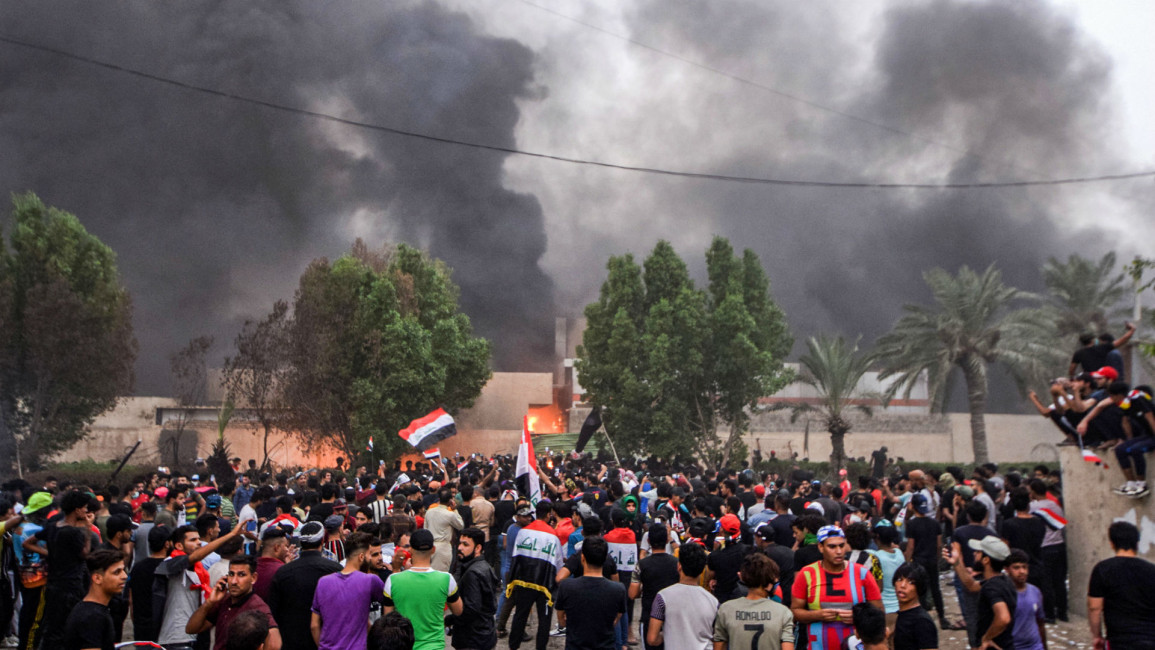Iraqi paramilitaries threaten 'revenge' after offices torched amid raging anti-govt protests
Demonstrators set fire to dozens of government buildings and offices belonging to the influential Hashed al-Shaabi paramilitary force across southern cities late on Friday.
In Missan province, the headquarters of the Asaib Ahl Al-Haq, one of the Hashed factions, was torched and a leading commander of the group reportedly killed.
Wissam al-Alyawi was later pronounced dead by the group, after footage circulated online showing him writhing in an ambulance as a crowd of men tried to break into it.
Asaib chief Qais al-Khazaali was in Baghdad on Saturday for the funeral procession of Alyawi and his brother Issam, apparently killed in the same incident.
"His blood is on America and Israel's hands, but I will take revenge - many times over," Khazaali told mourners, holding back tears as he stood next to their wailing mother.
"This blood is proof to all our people of the size of the conspiracy that is targeting us," he said.
Dozens of Hashed fighters were gathered in military fatigues for the procession in central Baghdad, just a few districts south of where protests were taking place in Tahrir (Liberation) Square.
Another paramilitary force, Saraya al-Salam, had also been spotted in Baghdad in recent days after their leader Moqtada al-Sadr threw his weight behind the demonstrations.
The Hashed was founded in 2014 to fight the Islamic State group but its factions have since been ordered to incorporate into the state security services.
The US and Israel fear some of the factions are too closely tied to Iran, their regional foe.
The Badr Organisation, a powerful Iranian-backed armed group whose offices were set alight in the southern city of Diwaniyah, also blamed Israel and the United States for Alyawi's death.
"They don't want a stable Iraq. They want to pull it into discord and chaos," said its head Hadi al-Ameri, who also attended the funeral.
And Harakat Nujaba, an Iraqi paramilitary faction close to Iran, warned protesters to stay peaceful.
"Take a careful look, and let us be united," it said in an online statement. 
On Saturday, three people died in the southern city of Nasiriyah as they tried to torch a local official's home, a police source told AFP. Three protesters also died in Baghdad, according to the Iraqi Human Rights Commission.
The violence came a day after 42 protesters died from live rounds, tear gas canisters or while torching government buildings or Hashed offices in the south.
The storming of those buildings marks a new phase in the south, and authorities imposed strict curfews that prevented renewed protests Saturday in most of those cities.
There have been no such incidents so far in the capital, where hundreds of protesters were still gathering.
The United Nations on Saturday said it was "tragic" to see renewed violence but also warned against "armed spoilers".
"Armed entities sabotaging the peaceful demonstrations, eroding the government's credibility and ability to act, cannot be tolerated," said the UN top official in Iraq, Jeanine Hennis-Plasschaert.
Despite the violence, demonstrators tried to reach Baghdad's high-security Green Zone on Saturday morning, where parliament is scheduled to "discuss protesters' demands, cabinet's decisions and the implementation of reforms" later in the day, according to its agenda.
Security forces fired tear gas to force protesters away from Tahrir (Liberation) Square and the adjacent Al-Jumhuriya bridge, which leads to the Green Zone, home to government offices and foreign embassies.
Read more: Desperate Iraqi youth renew protests in unyielding attempt to reclaim their homeland
Authorities erected concrete barriers and barbed wire around government buildings and deployed security reinforcement on Saturday, witnesses told The New Arab.
Security forces imposed a curfew across several southern provinces on Friday, a move also implemented earlier this month in the first wave of anti-government protests.
On Saturday, the curfew was extended "until further notice" in Karbala and Maysan, The New Arab's local reporter confirmed.
Among the provinces targeted was Basra, which was swept up in its own wave of protests last year over moribund public services, with outraged citizens also burning government and party offices.
A first wave of protests erupted on October 1, demanding an end to corruption and unemployment before escalating to calls for an overhaul of the political system.
More than 150 people were killed, according to a government probe, most of them protesters in Baghdad who died of gunshot wounds to the head or chest.
In response, authorities have pledged a laundry list of measures including hiring drives, increased pensions and a cabinet reshuffle.
New education and health ministers were approved by parliament earlier this month, the only time it was able to reach quorum since protests began.
But protesters seemed unimpressed and called for a resumption of nationwide demonstrations on October 25.
Baghdad ranks as OPEC's second-biggest oil producer - but it is also the 12th most corrupt nation in the world, according to Transparency International. One in five Iraqis lives in poverty and youth unemployment sits around 25 percent, according to the World Bank.
This year's demonstrations are seen as unprecedented due to their independence from any political or religious faction and the violence with which they have been met.
Follow us on Twitter and Instagram to stay connected



